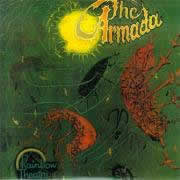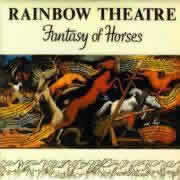In Australia there isn't only kangaroos and, talking about Prog, there isn't only Sebastian Hardie. Rainbow Theatre was just one, and not the less original, of the many bands that populated the Prog scene at the antipodes. Authors of just two albums ( "The Armada" 1975, "Fantasy of Horses" 1976), they remained almost unknown to the wide audience, up to few years ago, when both albums were illegally reissued by a Japanese label, what contributed to make their name known among a certain number of listeners. We have been able to get in touch with the mind of Rainbow Theatre, Julian Browning, and we talked with him about the past but also, at last, about the next (legal!)reissues.
How did Rainbow Theatre start?
I formed Rainbow Theatre in 1973 with Ferg McKinnon {bass} and Graeme Carter  {drums} we practiced as tight rhythm section sound before Marty Rose {vocals} and Steve Nash {sax, clarinet, congas} joined and we began performing gigs in Melbourne. Trumpeter Frank Graham {Graeme's uncle} and Don Santin {trombone} then joined with Keith Hoban as new vocalist. By then we were performing music from "The Armada" without the choir. We recorded "The Armada" in 1975 with members of the Victorian Opera Company Choir of which Keith Hoban was a member. Following this we did some concerts with the choir on stage while still performing 7 member concerts at smaller venues. These featured more jazz-rock, with lots of improvisation, and less "Symphonic Rock". {drums} we practiced as tight rhythm section sound before Marty Rose {vocals} and Steve Nash {sax, clarinet, congas} joined and we began performing gigs in Melbourne. Trumpeter Frank Graham {Graeme's uncle} and Don Santin {trombone} then joined with Keith Hoban as new vocalist. By then we were performing music from "The Armada" without the choir. We recorded "The Armada" in 1975 with members of the Victorian Opera Company Choir of which Keith Hoban was a member. Following this we did some concerts with the choir on stage while still performing 7 member concerts at smaller venues. These featured more jazz-rock, with lots of improvisation, and less "Symphonic Rock".
Was it a real band, a personal project or what?
It was a real band and a personal project. We did a lot of practice and loved performing live together.
The group split up after only two albums, what made you decide to end it all?
Rainbow Theatre was a labour of love for us all part-time. We all had day jobs. We did take time out after "Fantasy of Horses" and planned to re-form, yet, for a number of reasons this did not eventuate. At this time I became fascinated in the symphony orchestra and wanted to write a symphony!
After Rainbow Theatre did you make other musical experiences?
After Rainbow Theatre I studied composition and conducting with professor Keith Humble of Latrobe University and composed/performed a number of projects. The reissue of "Fantasy of Horses" plans to include a movement of my 3rd Symphony performed by the Melbourne Symphony Orchestra. It has some similarities with Rainbow Theatre in style. 1997 I was resident composer at Melbourne Grammar and performed my 8th Symphony. I have had my 7th Symphony performed by the Malvern Symphony Orchestra. I have conducted and performed a number of projects since Rainbow Theatre but never formed another band or ensemble.
How do you judge, after 30 years, your albums?
I wish the pressing of "The Armada" was a lot better. I remember being disappointed at the time. Hopefully the reissues will give it more justice as they will be remastered from the original masters of both albums which have been in my hands since the recordings. I can point out many things I would have liked done better. However, 30 years is a long time ago and I believe we all did very well at the time.
Your music is rather complex: what kind of recording and producing techniques did you use in studio?
We were a very well rehearsed band and every musician could read. We had limited studio time so very little was left to chance. Despite some overdubbing, most of what one hears on the albums is how we would perform live.
How was the Progressive music scene in Australia in those days? Do you remember any good bands? Did you have many chances to play live?
They were exciting days with many great bands. Sebatian Hardie had a beautiful sound and were a pleasure to see. Other favourites were Spectrum, Split Enz, and Chain. The most powerful band was Billy Thorpe and the Aztecs when Lobby Lloyde was lead guitarist. Progressive bands rarely performed at the dance gigs but we did perform at the universities, colleges, some big pubs and the night clubs. There were many venues in those days. Disco music took over in the late 70's and even today there are fewer venues for non-dance bands.
Your music is strongly influenced by classical music: is there an author who particularly inspired you?
My main classical influences at the time were Wagner, Mahler and Stravinsky.
Among rock artists, which one/s represented your main inspiration sources?
King Crimson, Emerson Lake and Palmer and YES were favourites though the big band music of Duke Ellington, Count Basie and Buddy Rich were inspirations too. I remember seeing Pink Floyd, YES, Deep Purple and Mahavishnu Orchestra in the 70's, these all made a huge impression on me.
What effects make to you knowing that there are bootleg copies of your albums around, while the original LP's became rare and expensive items? Are you planning a reissue?
I must say I was surprised to find out for the first time in 2004 about the bootleg CD's. The vinyls were exported into Europe and the US in the 70's yet I had no idea they had become classics. Being more involved in classical music for so many years I simply had no knowledge of what was going on. Artistically I am delighted yet look forward to authentic reissues from the original masters planned for early-mid 2006.
Beside classical instruments, there is also Mellotron (played by you); do you think that this instrument is still able to give emotions or it could be substituted by modern keyboards?
I am not familiar enough with contemporary progressive bands to have an opinion on this...though I am now listening to more! Having written for string sections in orchestras many times I know they have much more expansive, diverse and epic qualities than the Mellotron was supposed to emulate. However, I believe the Mellotron has a warm, romantic and ethereal quality which makes it quite unique and stand in it's own right. The closest orchestral string writing I can think of is Maurice Ravel's "Daphnis and Chloe" where Ravel mutes the strings and they trill together with bowing close to the fingerboard. Sounds like a Mellotron! The Mellotron's unique quivering sound is partly produced by the slight unevenness as the tapes move. If a modern electronic keyboard can imitate this, fine, if not... Long live the Mellotron!
"Fantasy of Horses" is less obscure than "Armada" and gives more room to instrumental parts with strings; what inspired you making your two albums and what are the main differences between them? What the lyrics are about?
"The Armada" was very dark so "Fantasy of Horses" had to be very bright! Like night and day the two albums contrast each other.  Inspirations for both albums came from different sources as I mention in the following notes on the lyrics, whether it is some fascinating event in history or the plight of wild horses in Australia. Once I have formed ideas about these I would write the music with the theme in mind and always thinking about each musician. They were all brilliant players so I could ask for the near impossible! All musicians thrived on a challenge and I think we accomplished a unique sound. Inspirations for both albums came from different sources as I mention in the following notes on the lyrics, whether it is some fascinating event in history or the plight of wild horses in Australia. Once I have formed ideas about these I would write the music with the theme in mind and always thinking about each musician. They were all brilliant players so I could ask for the near impossible! All musicians thrived on a challenge and I think we accomplished a unique sound.
THE ARMADA: "The Darkness Motive" About a place called Nicholas Gardens which is in the Dandenong Ranges near Melbourne. It has lakes with swans, magnificent gardens, fern gullies and is surrounded by huge forests. I lived next to it in the 70's and enjoyed visiting it in the evenings.
"Song 1" Written for friends who lived at Eltham near Melbourne.
"Petworth House" About the artist William Turner's stay at this house in the 1830's Sussex England.
"Song 2" Prelude to "The Armada" About the Spanish Armada 1588 when 130 ships attempted to invade England at the time of Elizabeth 1. The ships were swept up the English Channel and most sunk off the coast of Scotland and Ireland.
FANTASY OF HORSES: "Dancer" The song of a young girl wishing to be a ballerina.
"Fantasy of Horses" Australia has hundreds of wild horses living in the mountains in eastern Australia through to Queensland. They began running wild since European settlement circa 1800's and still exist today. Many were hunted, trapped and slaughtered. Some were, and still are, caught and domesticated. Many, like me, hope they will always exist in the wild and run free.
|